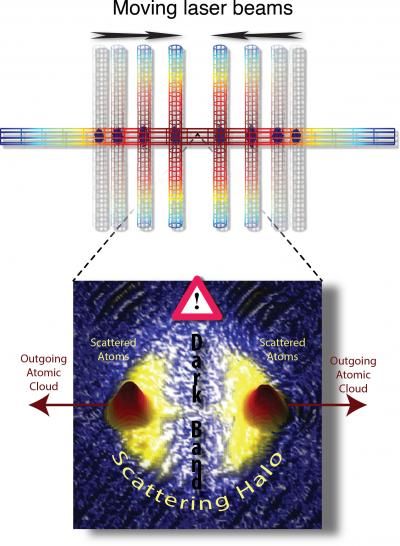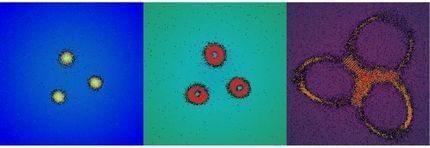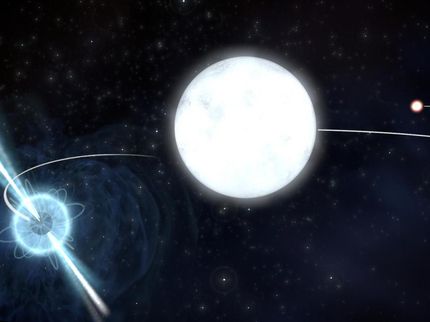Physicists collide ultracold atoms to observe key quantum principle
Advertisement
Physicists from New Zealand's University of Otago have used steerable 'optical tweezers' to split minute clouds of ultracold atoms and slowly smash them together to directly observe a key theoretical principle of quantum mechanics.

University of Otago physicist Niels Kjærgaard and his team have used extremely precisely controlled laser beams to confine, accelerate and gently collide ultracold atomic clouds of fermionic potassium. This allowed them to directly observe a key principle of quantum theory, the Pauli Exclusion Principle. This principle predicts a forbidden zone along a meridian of the spherical halo of scattered particles, which the Otago experiments indeed unveiled. The dark band in the graphic shows a rule derived from the principle in action. This rule is that indistinguishable fermions cannot scatter out at 90 degrees to the collision axis.
Niels Kjærgaard
The principle, known as Pauli Exclusion, places fundamental constraints on the behavior of groups of identical particles and underpins the structure and stability of atoms as well as the mechanical, electrical, magnetic and chemical properties of almost all materials.
Otago Physics researcher Associate Professor Niels Kjærgaard led the research, which is newly published in the prestigious journal Nature Communications.
Kjærgaard and his team used extremely precisely controlled laser beams to confine, accelerate and gently collide ultracold atomic clouds of fermionic potassium. The atomic clouds had a temperature of a mere millionth of degree Kelvin above absolute zero.
The Pauli Exclusion Principle predicts a forbidden zone along a meridian of the spherical halo of scattered particles, which the experiments indeed unveiled.
"This dark band results from a 'no side-stepping' rule that the principle dictates, which is that indistinguishable fermions cannot scatter out at 90 degrees to the collision axis," Kjærgaard says.
When PhD student Ryan Thomas looked more closely at his data, he found that under some conditions the images of scattering halos from the particles would actually display side-stepping--the dark band would be less dark.
"This is not because the rule suddenly breaks down, but because there can be situations where a particle scatters multiple times with consecutively new collision axes," Associate Professor Kjærgaard says.
This particular finding has important implications for gaining insights into the particulars of the underlying processes governing multiple particle scattering.
Original publication
R. Thomas, K. O. Roberts, E. Tiesinga, A. C. J. Wade, P. B. Blakie, A. B. Deb & N. Kjærgaard; "Multiple scattering dynamics of fermions at an isolated p-wave resonance"; Nature Comm; 2016


























































